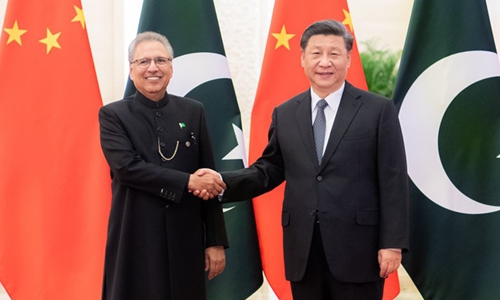
Chinese President Xi Jinping holds talks with Pakistani President Arif Alvi at the Great Hall of the People in Beijing, capital of China on Tuesday. (Photo: Xinhua)
With many countries around the world trying to cope with the spread of the novel coronavirus, Pakistani President Arif Alvi wrapped up a two-day visit to China on Tuesday. Alvi's visit indicates the long-held friendship between the two countries won't be held back by the pandemic. The Global Times asked two Chinese experts to share their views on the likely reasons and outcomes of Alvi's visit.
Qian Feng, senior fellow of Taihe Institute, director of research department of National Strategy Institute of Tsinghua University
China and Pakistan are good friends, partners, neighbors, and siblings that stand together through storms and stress. Their relationship is called an all-weather strategic cooperative partnership, in which "all-weather" means frequent visits under any condition are normal.
Alvi's visit during the ongoing COVID-19 pandemic mirrors Pakistan's firm support of the Chinese people. At the early stage of the coronavirus outbreak in China, Pakistan offered medical supplies even as it was confronting a sluggish economy and a lack of reserves for its own use. This visit by Pakistan's president also reflects Islamabad's positive affirmation of China's achievements in epidemic prevention and control, and its diplomatic support toward Beijing.
The China-Pakistan Economic Corridor (CPEC) is the top agenda item between the two countries. CPEC is a benchmark project under the framework of China-proposed Belt and Road Initiative (BRI) and has yielded fruitful results after years of joint efforts. Beijing and Islamabad have been considering how to promote CPEC projects to better serve local communities and people's livelihood.
The pandemic has to some extent influenced CPEC. Yet the impact has been limited, because the two countries have already laid a solid foundation for collaboration and visible achievements have been made.
The virus could cause CPEC projects to slow but they have not stopped. Since the two sides are aiming to forge a closer China-Pakistan community of a shared future, CPEC is a long-term program and won't be hard hit by any temporary obstacle.
This high-level visit does not have to result in some heavyweight agreement. It was about showing mutual support between China and Pakistan regardless of the challenges in the international environment.
Zhao Gancheng, research fellow at the Shanghai Institute for International Studies
As the novel coronavirus continues to spread globally, South Asia remains relatively less affected. Yet no one can be sure how long the current situation can be maintained as the region is significantly short of medical resources. For Pakistan, this might be a serious situation and it needs to consult with China.
The contradiction between Pakistan and India over Kashmir is an important issue that hasn't been settled. Pakistan was hoping India would make some adjustments considering the international pressure it received for revoking the autonomy of the disputed state of Jammu and Kashmir last year. There seems to be few signs this will happen anytime soon. Pakistan sees this as a crisis and likely wants to consult with China on the matter.
Islamabad is also yearning for more investment from Beijing, as Pakistan's economy remains volatile and the country is faced with a heavy foreign debt burden. Since China began to see promising outcomes from its COVID-19 prevention and control, Pakistan is hoping to further promote the construction of CPEC, which is of vital importance to Pakistan's economic development.
CPEC is a long-term initiative under the framework of the BRI, which by no means will be severely impacted by any temporary challenge, including the pandemic. China is now slowly resuming economic activities, and if new CPEC projects can be initiated, they would play a significant role in China's foreign strategy in the post-pandemic era.


